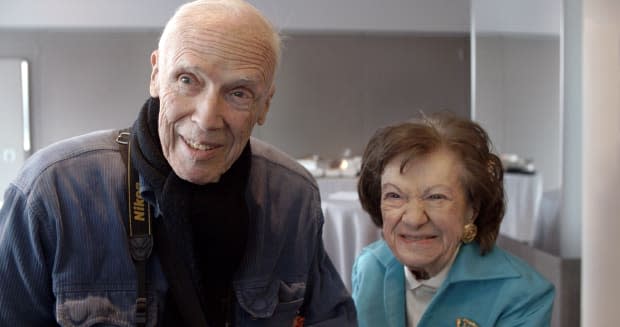The New Ruth Finley Documentary Is an Emotional Farewell to Fashion's Old Guard
- Oops!Something went wrong.Please try again later.
"Calendar Girl" chronicles Finley's democratic oversight of the all-important Fashion Calendar, from its launch in 1945 to its acquisition by the CFDA in 2014.
Early in my fashion career, I remember being stunned to learn that the Fashion Calendar — the official schedule for New York Fashion Week, to which everyone subscribed — was being run by one woman, whom you had to call on the phone to get a listing or request a hard copy.
That woman was Ruth Finley, a figure beloved and respected by the fashion industry — and not well-known outside of it. But in 2014, a documentary crew led by director Christian D. Bruun began work on a film that would peel back the proverbial curtain on Finley's life and career, including how she managed an increasingly chaotic show schedule for 69 years practically on her own. It was delayed due to financing challenges, but it's finally being released on Wednesday, making it a posthumous reflection on Finley, who passed away in 2018.

"Calendar Girl" shows viewers a stark contrast between the unglamorous, behind-the-scenes, analog nature of Finely's role and the absolute power she held over who got to show when during New York Fashion Week. We see her, at 95 years old, shuffling around a tiny, cluttered office with just three desks, answering phones and slowly handwriting names like "C. Herrera" and "R. Lauren" onto a paper grid or putting addresses down on index cards and filing them away in a shoebox. A younger employee is shown waiting as hundreds of copies of the publication are printed off on pink paper, the other employee placing them into envelopes and addressing them to send off to just about every person who works in fashion.
We also hear from influential industry figures like the late Bill Cunningham and designers like Herrera, Diane von Furstenburg and Nicole Miller, who all talk about Finley with affection and reverence. Like just about every American designer you've heard of (that launched their business before 2014), they called Finley personally to schedule their first-ever fashion shows, to maintain their preferred slots or to complain about getting undesirable ones.

The fashion industry is not lacking in inflated egos, and Finley's apparent superpower was resolving scheduling conflicts without damaging them. Words like "democratic," "impartial" and "tough" are used to describe her approach to running the Calendar. It's like Finley was an Olivia Pope-like handler in the body of a minuscule nonagenarian who could barely ascend a flight of stairs.
She could, though: She tells the viewer that, while conceding that she can't run up and down the subway steps as spryly as she used to do. But the documentary shows Finley attending multiple New York Fashion Week shows per day — a smaller number than when she was younger, but she appears to have more energy and genuine enthusiasm for the whole spectacle than people decades younger than her. Her love of fashion and designers is clear.

Her perseverance is also remarkable — and evidently something she'd always possessed. Coming up in a time when women were expected to stay home and raise children, she always planned to work. She landed a job as fashion PR legend and CFDA founder Eleanor Lambert's assistant, which led to her creation of the Calendar. And in a time when divorces were rare and controversial, she got one from her first husband in the 1950s. When her second husband passed away suddenly in his early 40s, she took care of her three sons alone, all while continuing to run the Calendar out of her home (also alone).
In the film's present-day, there are moments when her perseverance verges on stubbornness. She refuses to put the Calendar online, for instance, explaining how she decided to use pink paper to make it easier for people to find on their desks. She never considers modernizing the process, holding onto physical rolodexes, shoeboxes with index cards and landline phones. Despite her age, she obviously has no interest in retiring and describes a desire to keep the Fashion Calendar business in her family, even though her sons, who seemingly have no ties to fashion, aren't interested in taking it over. Begrudgingly, she ends up selling it to the CFDA. (It's insinuated that if she didn't sell to the organization, it would have started its own calendar without her.)

It's emotional to watch Finley lose control of something she started and guarded so closely for decades. We see her getting nostalgic, looking at archived editions of the Calendar from the 1940s, remembering events she gleefully attended. She never openly complains, but seems to lament the Calendar's transition into a digital publication without the personal touch she gave it, inevitable as it may have been. It's not in the film, but it's worth noting that the calendar has also become less cohesive in recent seasons, with the CFDA and IMG now operating their own versions.
Finley was a pillar of fashion's old guard, and as we navigate a new era of radical change for the industry and how it operates, it's nice to look back at an old one — and bid it a respectful farewell.
You can purchase tickets to digitally screen "Calendar Girl" between Nov. 11 and Nov. 19 here.
Never miss the latest fashion industry news. Sign up for the Fashionista daily newsletter.
